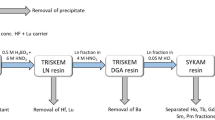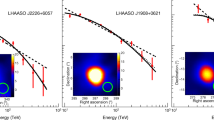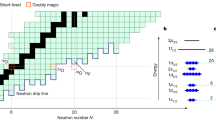Abstract
WITH the single exception of samarium-152 1, no α-ray emitter of nuclear charge smaller than 83 is known. On the other hand, it is concluded from the general trend of the mass-defect curve that many heavy nuclei must be unstable against a-decay. Circumstantial evidence for the existence of α-ray emitters hitherto unknown is provided by certain pleochroic haloes2 and, possibly, by ‘excess helium’ in minerals, notably beryl3. The difficulty in identifying additional α-active nuclear species must be due to the slowness of their decay, or to their low abundance in the natural elements.
This is a preview of subscription content, access via your institution
Access options
Subscribe to this journal
Receive 51 print issues and online access
$199.00 per year
only $3.90 per issue
Buy this article
- Purchase on Springer Link
- Instant access to full article PDF
Prices may be subject to local taxes which are calculated during checkout
Similar content being viewed by others
References
Dempster, Phys. Rev., 73, 1125 (1948).
See Schintlmeister, Wiener Ber., 145, 449 (1936). Henderson, Proc Roy. Soc., A, 173, 250 (1939).
Glückauf and Paneth, Proc. Roy. Soc., A, 165, 283 (1938).
Libby, Phys. Rev., 44, 512 (1933).
Author information
Authors and Affiliations
Rights and permissions
About this article
Cite this article
JENKNER, K., BRODA, E. Some Upper Limits of Possible Alpha-Activity. Nature 164, 412–413 (1949). https://doi.org/10.1038/164412a0
Issue Date:
DOI: https://doi.org/10.1038/164412a0
This article is cited by
-
Experimental detection of α-particles from the radioactive decay of natural bismuth
Nature (2003)
-
Alpha-activity of209Bi
Lettere al Nuovo Cimento (1972)
-
Der Nachweis seltenen α-Zerfalls mit Hilfe der Photoplatte
Experientia (1951)
-
Some More Lower Limits of Half-Lives for α-Decay
Nature (1949)
-
An Examination of Praseodymium, Neodymium and Samarium for α-Activity
Nature (1949)
Comments
By submitting a comment you agree to abide by our Terms and Community Guidelines. If you find something abusive or that does not comply with our terms or guidelines please flag it as inappropriate.



